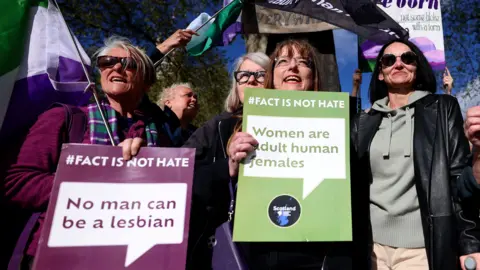 EPA
EPAThe NHS will be pursued if it does not follow new guidance on single-sex spaces, the chairwoman of the Equality and Human Rights Commission (EHRC) has said.
Along with other public bodies, the NHS will be receiving guidelines after the UK Supreme Court unanimously ruled a woman is defined by biological sex under equalities law.
“We’ve been speaking to the health service for an inordinately long time – we will now be asking them when they will be updating their advice,” Baroness Falkner told BBC Radio 4’s Today programme.
Currently the NHS guidance says trans people should be accommodated according to the way they dress, their names and their pronouns. Under the ruling this would be scrapped.
The EHRC says it is “working at pace” to provide an updated code of conduct for services, including the NHS and prisons, and it expects its updated guidance to be in place by the summer.
The ruling could have implications for spaces such as hospital wards, changing rooms and domestic refuges.
Asked whether the EHRC would pursue the NHS if it doesn’t change, Baroness Falkner replied “yes we will”.
“We will be having those conversations with them to update that guidance,” she said.
An NHS spokesperson told the BBC the service was “reviewing guidance on same sex accommodation” and as part of this process “will consider and take into account all relevant legislation and the Supreme Court ruling”.
Wednesday’s case was brought by women’s rights campaigners who challenged the Scottish government, arguing sex-based protections should apply only to people that are born female.
Judges ruled that when the term “woman” is used in the Equality Act it means a biological woman, and “sex” means biological sex.
This means a Gender Recognition Certificate (GRC) – a legal document that recognises an individual’s gender identity – will now not change a person’s legal sex for the purposes of the Equality Act.
The Supreme Court justices argued this was the only consistent, coherent interpretation.
There is already Equality Act guidance which allows for women-only spaces, such as toilets, changing rooms and hospital wards in certain circumstances.
But under the new ruling a person who was born male but identifies as a woman does not have a right to use a space or service designated as women only.
That includes transgender women who have legally changed their gender and hold a GRC.
Baroness Falkner said trans people should use their “power of advocacy” to ask for facilities including a “third space” for toilets.
“Single-sex services like changing rooms must be based on biological sex if a male person is allowed to use – it’s no longer a single sex space.”
She added the ruling was “a victory for common sense only if you recognise that trans people exist, they have rights and their rights must be respected”.
British Transport Police said trans women in custody would now be searched by male officers as an interim measure while it reviews its policies and practices.
“Under previous policy, we had advised that someone with a GRC may be searched in accordance with their acquired sex,” a spokesperson said.
“However as an interim position while we digest yesterday’s judgement, we have advised our officers that any same sex searches in custody are to be undertaken in accordance with the biological birth sex of the detainee.”
Baroness Falkner said the next stage of litigation may well be tests of the efficacy of GRCs.
Asked about whether she thought GRCs were now “worthless”, she replied: “We don’t believe they are. We think they’re quite important.”
The new guidance could also have an impact on women’s sport, where the question over whether transgender women can participate has been a high-profile issue in recent years.
Sports have tightened up rules around transgender athletes at the elite levels. Athletics, cycling and aquatics have banned transgender women from taking part in women’s events, while other sports have put in place eligibility criteria.
Conservative leader Kemi Badenoch said a review on gender and equality laws was “a good idea”.
Speaking to broadcasters during a visit to Cambridge, she said: “We need to make sure that the law is clear and the public bodies follow the law, not guidance from organisations that don’t understand it.”
She added the laws needed to be updated to ensure that they are “there to prevent discrimination, not for social engineering”.
Scottish Greens MSP Maggie Chapman, a prominent supporter of trans rights, told the BBC’s Good Morning Scotland programme the decision would “stoke the fires of the culture war” and trans people now feared they could lose access to facilities they’ve used, in some cases, for decades.
She added that trans people had been attacked in recent years “just for being who they are” and she was “concerned” about the impact of the Supreme Court decision.
Trans rights campaigners have said they will be examining the judgment closely to decide on their next steps.
The UK government has welcomed the “clarity and confidence” for women and service providers brought by the judgement.
A government spokesperson said: “Single sex spaces are protected in law and will always be protected by this government, and trusts should follow the clarity the ruling provides.”
Health minister Karin Smyth said the government would be reviewing the ruling to “make sure we are fully compliant with it” and would be working with equality bodies to make sure organisations were fully compliant.
She said the government was not interested in “so-called culture wars” and believed that everybody should have “their dignity and privacy and their rights respected”.
“I think now is the time to make sure that we look to the future, that rights are very clear for people and that service providers absolutely make sure they comply with the law,” she said.
www.bbc.com (Article Sourced Website)
#NHS #pursued #gender #policies #dont #change #equalities #watchdog
